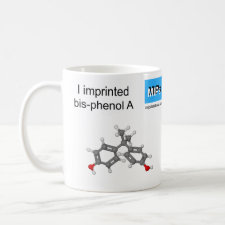
Authors: Duan FF, Chen CQ, Chen L, Sun YJ, Wang YW, Yang YZ, Liu XG, Qin Y
Article Title: Preparation and Evaluation of Water-Compatible Surface Molecularly Imprinted Polymers for Selective Adsorption of Bisphenol A from Aqueous Solution.
Publication date: 2014
Journal: Industrial & Engineering Chemistry Research
Volume: 53
Issue: (37)
Page numbers: 14291-14300.
DOI: 10.1021/ie5028099
Abstract: Water-compatible molecularly imprinted polymers (MIPs) for adsorbing bisphenol A (BPA) in aqueous solutions are synthesized using water-soluble monomer as surface hydrophilicity-increasing agent via surface addition?fragmentation chain transfer polymerization. The formation and structure of these hybrid materials are verified by Fourier transform infrared spectroscopy, contact angle studies, thermogravimetric analysis, and scanning electron microscopy. The characterization and adsorption results indicate that the molecularly imprinted polymers prepared with 2-acrylamido-2-methylpropanesulfonic acid (AMPS/MIPs) are water-compatible (the contact angle is 14°). The excellent dispersion of AMPS/MIPs in water provides more opportunity for BPA molecules to access the imprinted cavities and improves their recognition characteristics. The kinetics and isotherm data of AMPS/MIPs can be well described by the pseudo-second-order kinetic model and the Langmuir isotherm, respectively. The thermodynamic studies indicate that the adsorption process is a spontaneous exothermic process
Template and target information: bisphenol A, BPA



Join the Society for Molecular Imprinting

New items RSS feed
Sign-up for e-mail updates:
Choose between receiving an occasional newsletter or more frequent e-mail alerts.
Click here to go to the sign-up page.
Is your name elemental or peptidic? Enter your name and find out by clicking either of the buttons below!
Other products you may like:
 MIPdatabase
MIPdatabase









